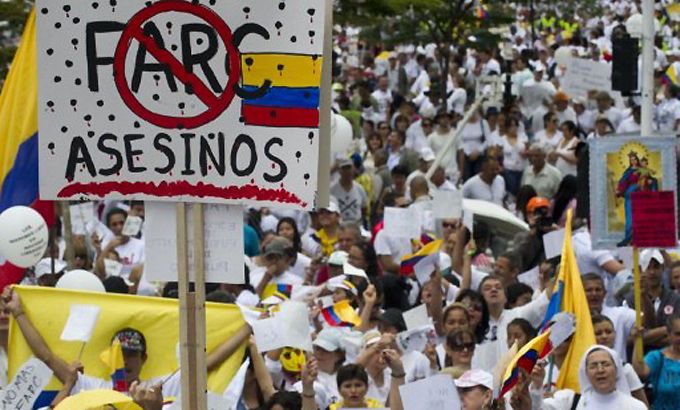
Will Colombia talk peace with the FARC?
As the rebels again call for negotiations, we ask if the government will respond in kind to try to end the conflict.
Colombia’s largest rebel group, the Revolutionary Armed Forces of Colombia (FARC), has announced that it will release what it calls its remaining prisoners of war.
|
“The whole idea of negotiations has been removed from the table as an option for the last decade. Now we’re seeing the FARC militarily weakened. The problem is, there was never an identified endgame.“ – Virginia Bouvier from the US Institute of Peace |
The group still holds 10 police officers and soldiers, some of whom were captured 14 years ago. Hundreds of civilian hostages are also thought to be in their custody.
The group’s leaders have called for negotiations to end a civil war which has spanned almost half a century, but did not promise an end to hostilities with the government.
In a long statement on its website, the FARC declared:
“Much has been said about the retention of people, men or women of the civilian population, for financial ends for the FARC to sustain our fight … With the same will expressed before, we announce that from this date we forbid this practice in our revolutionary conduct.”
|
“The FARC of today engages in serious human rights violations, uses prohibited weapons under international humanitarian law, recruits minors, terrorises civilians without making any distinction between combatants and civilians, and were the world champions on abductions.” – Jose Miguel Vivanco from Human Rights Watch |
Juan Manuel Santos, the Colombian president, described the move as an important step but not enough to justify starting peace talks.
His predecessor, Alvaro Uribe, who was responsible for a major crackdown on the rebels during his tenure, dismissed the group’s words as trickery.
The rebels have been staging a number of attacks in the country, with local media reporting the deaths of several soldiers in the last 24 hours.
So does the announcement by the FARC make talks to end the country’s civil war a possibility? Just how likely are negotiations with the government? And, what does the future hold for the group?
Joining Inside Story Americas with presenter Anand Naidoo to discuss this are: Jorge Restrepo, a political analyst at the Conflict Analysis and Resource Centre; Virginia Bouvier, who works on Latin America for the US Institute of Peace; and Jose Miguel Vivanco, the director for Americas at Human Rights Watch.
|
“There is no political support for the FARC, which does have a political role. They have political power coming from guns, violence and from the capacity to isolate entire areas and to influence and even control those areas. The government and the Colombian society know that the FARC have been defeated [militarily] …. We have won a war but we haven’t achieved peace.” Jorge Restrepo, a political analyst |
|
Who are the FARC? Colombian paramilitaries: |